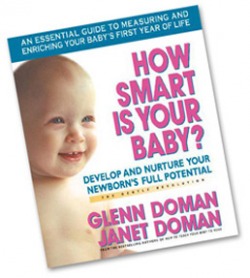 My wife is expecting a baby boy on 8 Febuary 2010. So I must brush up my baby-rearing skills. A great source of information for nurturing a young baby's potential is The Institutes for the Achievement of Human Potential in Philadelphia. The Institutes have been serving brain-injured children since 1955. Their experience eventually resulted in a series of books and materials for enhancing normal children's brain growth. I am reading the Institutes’ founder Glenn Doman's "How Smart is Your Baby?" which is essentially a guide to enriching a baby's first year of life. Surprisingly, a passage of the book touches on the philosophical debate between physicalism and idealism* regarding the nature of the mind. The book clearly favours physicalism. Page 21 of the book reads: "It is very important to remember that when we speak of the human brain we are speaking of that physical organ that occupies the skull and the spinal column and weighs three to four pounds. "We are not speaking of that nebulous thing called 'the mind.' The confusion between the organ called 'the brain' and the idea called 'the mind' has created problems in the past. "The mind has defied any agreed upon definition of what it is or what it is not. The brain, however, is material. It is easier to study. We can see it, feel it, and smell it. We can even taste it if we are inclined to do so. "The brain is a nice, clean orderly organ whose job is to take in data and process that data in such a way that its owner can relate to his environment appropriately at all times." Here, the idea is simple. "Mind" is vague and cannot be defined clearly. We are simply unable to study it. The brain, on the other hand, is something which we are able to study. For something that cannot be defined and we are unable to study, like "mind" and "God," all we can do is to remain silent. Only for something that we are able to understand, like all physical entities, that we can study and obtain meaningful knowledge of them. Ancient Chinese wisdom echoes here. Confucius said, "Respect ghosts and gods, and stay away from them." Also, "We know so little about this life, how can we know anything about after death?" Confucius teaches to be reserved and remain silent for vague and unknown things. Physicalism might not be the only explanation, but physicalism is the only explanation we can understand and handle. I am a physicalist because I am only able to understand the physicalist universe. *Physicalists argue that only the entities postulated by physical theory exist, and that the mind will eventually be explained in terms of these entities as physical theory continues to evolve. Idealists maintain that the mind is all that exists and that the external world is either mental itself, or an illusion created by the mind. http://en.wikipedia.org/wiki/Philosophy_of_mind 物理主義:「心靈」是大腦現象 我太太很可能於本年二月八日把男嬰誕下。所以,我必須惡補育嬰術。一個重要的資料來源是在費城的人類潛能促進學院。該研究所自1955年已經為腦損傷的兒童治療。他們後來發現他們的經驗可以幫助正常兒童的大腦發展。我正在讀學院創始人格連杜曼博士的《你的寶寶有多聰明?》這本書基本上是一個豐富嬰兒第一年生命的指南。出乎意料地,這本書輕輕涉及關於心靈本質的哲學辯論:物理主義和理想主義之間的爭論*。這本書明顯傾向物理主義。第21頁的內容如下: 「這點非常重要。當我們談到人類的大腦,我們說的是,一個位於頭骨和脊柱之內的,重量為3到4磅的身體器官。 「我們不是說一個所謂『心靈』的模糊慨念。以往,被稱為『大腦』的身體器官與被稱為『心靈』的理念曾經造成一些混淆。 「心靈從來沒有被成功地定義過它是甚麼或者不是甚麼。大腦則不同。它是物質的,更容易被認識。我們可以看到它,感覺它,嗅到它。我們甚至可以品嚐它,如果你有興趣的話。 「大腦是一個很好的,結構有序的器官。其任務是收集和處理數據,以適當地對環境作出反應。」 這裡非常簡單。所謂「心靈」的定義是含糊的,不能明確界定。我們根本無法對其進行研究。大腦則肯定是一樣存在的東西,我們可以研究它。不能被定義和無法被研究的東西,如「心靈」和「上帝」等,我們所能做的就只是保持沉默。只有我們有能力處理的東西,例如所有的物理實體,我們才可以學習它們以取得有意義的知識。 這與中國古代智慧不謀而合。孔子說:「敬鬼神而遠之!」,又說:「未知生,焉知死?」。孔子對虛玄未知之事持保留態度及保持沉默。物理主義可能不是唯一的解釋,但唯有物理主義是我們可以理解和處理的。我是物理主義者,因為能力所限,我只能明白物理主義的宇宙。 *物理主義者認為一切心靈現象都是由物質的大腦產生;心靈並不存在。理想主義者認為只有心靈存在,整個所謂物理世界都只是由心靈產生的幻覺。
0 Comments
|
Categories
All
Archives
February 2022
AuthorAlex from UUHK |
 RSS Feed
RSS Feed
